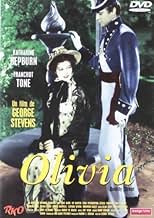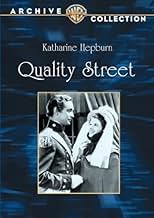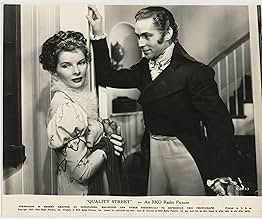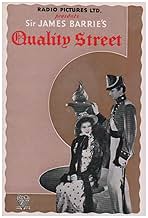NOTE IMDb
6,2/10
1,3 k
MA NOTE
Ajouter une intrigue dans votre langueIn the 1810s, an old maid poses as her own niece in order to teach her onetime beau a lesson.In the 1810s, an old maid poses as her own niece in order to teach her onetime beau a lesson.In the 1810s, an old maid poses as her own niece in order to teach her onetime beau a lesson.
- Nommé pour 1 Oscar
- 3 victoires et 1 nomination au total
Sherwood Bailey
- William Smith
- (non crédité)
William Bakewell
- Lt. Spicer
- (non crédité)
Joan Fontaine
- Charlotte Parratt
- (non crédité)
Helena Grant
- Fanny Willoughby
- (non crédité)
Bonita Granville
- Isabella
- (non crédité)
Carmencita Johnson
- Student
- (non crédité)
Payne B. Johnson
- School Boy
- (non crédité)
Darwood Kaye
- Student
- (non crédité)
Florence Lake
- Henrietta Turnbull
- (non crédité)
Helen Lynn
- Girl
- (non crédité)
Lydia McKim
- Schoolgirl
- (non crédité)
Clifford Severn
- Arthur, a Student
- (non crédité)
Histoire
Le saviez-vous
- AnecdotesThe Nestle produced chocolates "Quality Street" were named after J. M Barrie's play by their original manufacturer Mackintosh in 1936.
- GaffesWhen Phoebe and Susan are talking about Mr. B., Phoebe is on a chair and Susan is sitting on a sofa a certain distance near a bonnet. But on the following cuts, Susan's sitting position keeps changing so that she is gets closer and closer to the bonnet.
- Citations
Mary Willoughby: [Goes to the window and looks out] It's that impertinent recruiting sergeant. I passed him on the street yesterday. He closed one of his eyes at me, then quickly opened it again.
[She demonstrates to the other ladies in the room]
Mary Willoughby: I knew what he meant.
[She looks out again and sees the recruiting officer wink at her. She quickly closes the window curtain]
- Crédits fousOpening card:
1805 England Quality Street Where a gentleman passerby is an event.
- ConnexionsFeatured in George Stevens: A Filmmaker's Journey (1984)
Commentaire à la une
"Quality Street" from 1937 stars Katharine Hepburn, Franchot Tone, Fay Bainter, and Estelle Winwood. It's directed by George Stevens, who directed Hepburn later in Woman of the Year.
Hepburn plays Phoebe Throssel, a lovely young woman living with her spinster sister (Bainter) and surrounded by other spinsters who are neighbors in 1800. Phoebe is in love with one man, Valentine Brown -- as is pointed out in the film, other men have come calling, but Phoebe didn't want them.
Valentine, however, is off to the Napoleonic Wars. When he returns ten years later, Phoebe and her sister have opened a school in their home. Phoebe is embarrassed at being so exhausted and believes she has lost her looks. Nevertheless, Valentine wants her to attend the homecoming ball.
Phoebe, trying to prove something to herself, puts on a fancy dress and does her hair differently. When Valentine arrives, she introduces herself as Olivia ("Livvie"), Phoebe's niece. She gives him Phoebe's regrets, but she doesn't feel well. The two attend the ball together, where Livvy is surrounded by men. She believes that she now has a chance of Valentine proposing to Livvy. If only she can stay away from people who can expose her.
James Barrie wrote many plays that were performed by some of theater's biggest stars at the beginning of this century so it's no wonder Hollywood made it as a movie. It still retains many of its play-like qualities.
The character actors -- Bainter, Winwood, Eric Blore, are wonderful. Tone is very handsome though he doesn't have much to do. Though some might disagree, I felt Hepburn was somewhat miscast. Her portrayal of Phoebe/Livvie, though energetic, feels "put on" rather than organic. She was a tremendously strong actress but pulls back here - it doesn't seem natural.
The cast must have had a great deal of patience - Stevens, known as a very nice man, was known for having actors do 40 takes of one scene; it's one reason why Montgomery Clift never worked for him again after A Place in the Sun. He just didn't have the patience for it.
This is a charming, light film that looks stagy, but that shouldn't hurt your enjoyment of it.
Hepburn plays Phoebe Throssel, a lovely young woman living with her spinster sister (Bainter) and surrounded by other spinsters who are neighbors in 1800. Phoebe is in love with one man, Valentine Brown -- as is pointed out in the film, other men have come calling, but Phoebe didn't want them.
Valentine, however, is off to the Napoleonic Wars. When he returns ten years later, Phoebe and her sister have opened a school in their home. Phoebe is embarrassed at being so exhausted and believes she has lost her looks. Nevertheless, Valentine wants her to attend the homecoming ball.
Phoebe, trying to prove something to herself, puts on a fancy dress and does her hair differently. When Valentine arrives, she introduces herself as Olivia ("Livvie"), Phoebe's niece. She gives him Phoebe's regrets, but she doesn't feel well. The two attend the ball together, where Livvy is surrounded by men. She believes that she now has a chance of Valentine proposing to Livvy. If only she can stay away from people who can expose her.
James Barrie wrote many plays that were performed by some of theater's biggest stars at the beginning of this century so it's no wonder Hollywood made it as a movie. It still retains many of its play-like qualities.
The character actors -- Bainter, Winwood, Eric Blore, are wonderful. Tone is very handsome though he doesn't have much to do. Though some might disagree, I felt Hepburn was somewhat miscast. Her portrayal of Phoebe/Livvie, though energetic, feels "put on" rather than organic. She was a tremendously strong actress but pulls back here - it doesn't seem natural.
The cast must have had a great deal of patience - Stevens, known as a very nice man, was known for having actors do 40 takes of one scene; it's one reason why Montgomery Clift never worked for him again after A Place in the Sun. He just didn't have the patience for it.
This is a charming, light film that looks stagy, but that shouldn't hurt your enjoyment of it.
Meilleurs choix
Connectez-vous pour évaluer et suivre la liste de favoris afin de recevoir des recommandations personnalisées
- How long is Quality Street?Alimenté par Alexa
Détails
- Durée1 heure 23 minutes
- Couleur
- Rapport de forme
- 1.37 : 1
Contribuer à cette page
Suggérer une modification ou ajouter du contenu manquant

Lacune principale
By what name was Pour un baiser (1937) officially released in Canada in English?
Répondre
































